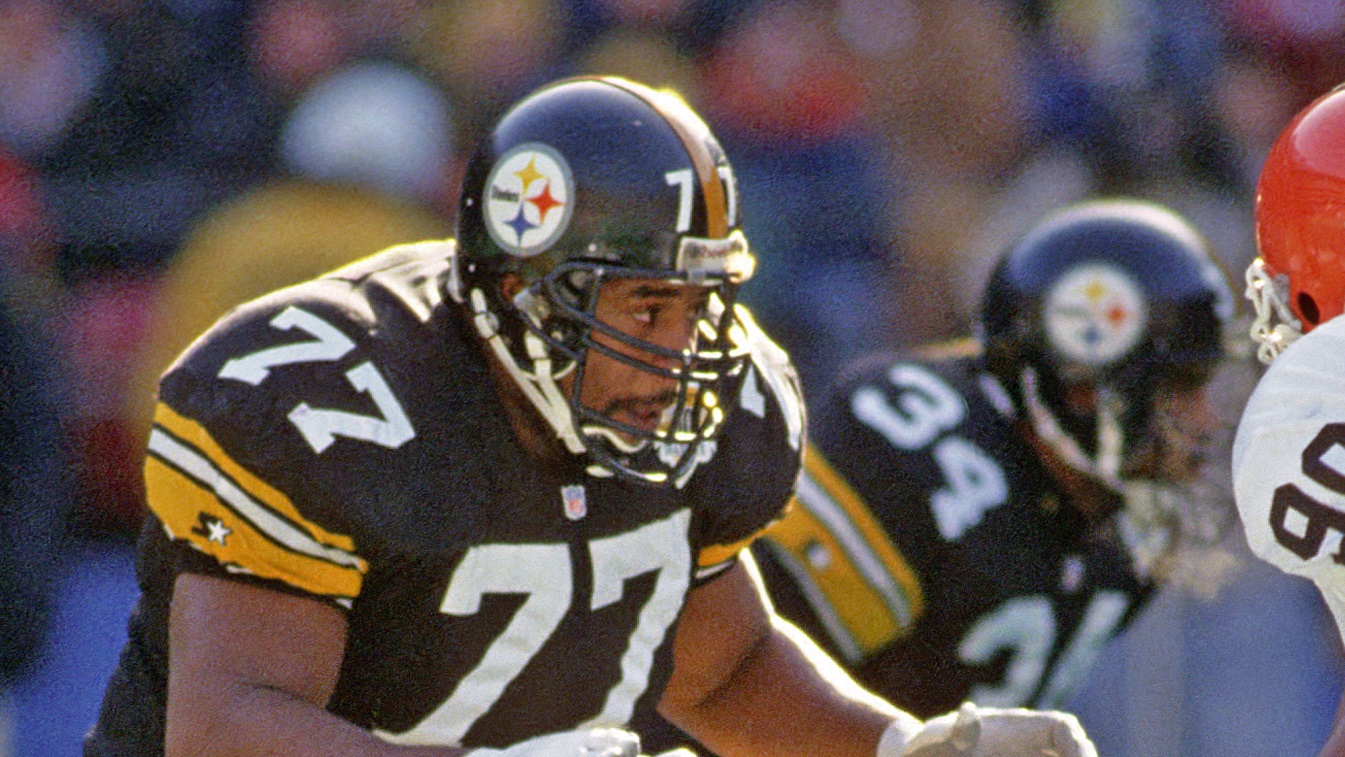NFL
Steelers Pro Bowl Guard Carlton Haselrig Was So Good That the NCAA Changed Its Rules

We’ll never know just how good Carlton Haselrig could have been as an NFL lineman because he ruined his Pittsburgh Steelers career with drug and alcohol problems. But his brief time as a college and pro athlete gave us a story unlike any before or since.
Haselrig gave up college football after one season, made history in wrestling, and then got back up to speed on the gridiron so quickly that he was voted one of the best offensive linemen in the sport in his third year playing for the Steelers.
Carlton Haselrig’s NFL fame was fleeting
RELATED: Rocky Bleier Survived a Grenade Injury and Won Four Super Bowls
Carlton Haselrig died Wednesday, July 22, at the age of 54 after several years of declining health. Haselrig had been suffering from liver disease, according to the Johnstown Tribune-Democrat in Pennsylvania.
It was a life cut short, just as his career had been cut short 25 years earlier. Haselrig grew up in a broken home, with both parents having the sorts of substance abuse problems he would experience in his own life after making it to the NFL.
Haselrig was in and out of rehab clinics during his too-brief NFL career that began on the Pittsburgh Steelers’ developmental squad in 1989. He disappeared for several days before the 1994 season, which would have been his fifth on the Steelers’ active roster. That was preceded by a drunk driving charge during which an unlicensed gun was found in his possession.
His wife left Haselrig and sought an order of protection, and he spent the season working as a laborer in Pittsburgh while trying to pull his life back together.
More setbacks before getting his life back on track
RELATED: The Tragic Death of Justin Strzelczyk After High-Speed Crash Was Linked to CTE
Carlton Haselrig had been selected All-Pro while blocking for Barry Foster in 1992, his second season as a Pittsburgh Steelers starting guard, before his life fell apart. The Steelers released him after his troubles appeared insurmountable, and he caught on in with the New York Jets to start 11 games in 1995.
Several more years of trouble, including time in jail, would follow. But Haselrig did eventually sort out his life. “He had his share of demons and faced them down,” Pat Pecora, Haselrig’s college wrestling coach at Pitt-Johnstown, told the Tribune-Review.
In fact, Haselrig became a moderately successful mixed martial arts fighter in his early 40s and spent the past few seasons as an assistant football and wrestling coach at Greater Johnstown High in Pennsylvania, where his amazing athletic career began. In 2019, a friend helped him pull together a short autobiography in which he acknowledged his failures and discussed how he’d overcome them.
“He got his life back together,” said co-author Kevin Emily said. “A lot of people wrote that dude off, turned their back on him, thought he was finished, and he proved them wrong.”
Carlton Haselrig’s amazing college career
RELATED: Ben Roethlisberger Says Lapse in College Spawned Addictions
Carlton Haselrig earned a Pennsylvania state wrestling championship despite the fact that his high school did not field a team in the sport. He enrolled at Lock Haven to play football but was injured and never got on the field before leaving after one semester.
Haselrig decided to put football behind him, transferred to Division II Pitt-Johnstown and immediately became a terror on the wrestling mats. He placed third as a heavyweight in the NCAA Division II tournament in his first season and then won three consecutive championships beginning in 1987.
Under NCAA rules at the time, the winners of the Division II and III tournaments earned berths in the ensuing Division I tournament. Haselrig made the most of the opportunity by winning the Division I title all three years, in the process extending his winning streak to 122 matches.
That gave Haselrig the rightful claim to six NCAA individual championships, making him one of the sport’s all-time greats.
“After he won the championship six times, the NCAA made a rule that you can no longer do that,” said Kevin Emily, a high school coach who helped Haselrig write his autobiography. “It’s in the books and is unofficially called the ‘Haselrig rule.’ He was the last person the NCAA allowed to move up to the next level. What’s special about that is that no one else has ever won six national championships, and nobody can ever do it again.”











